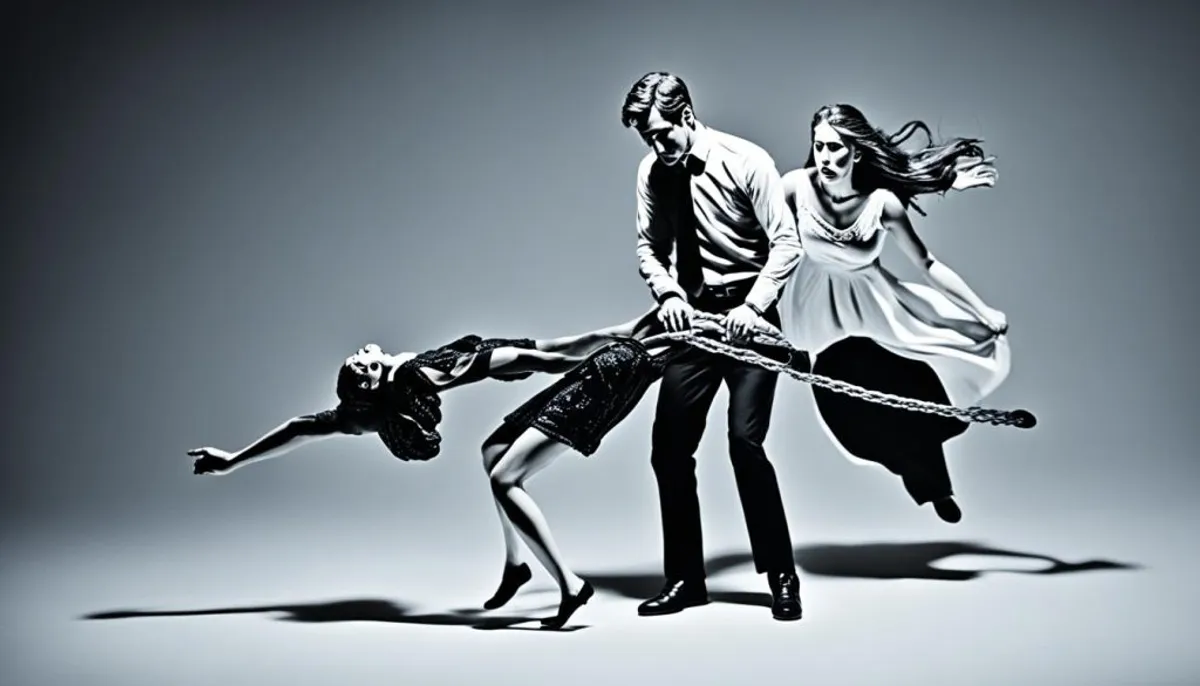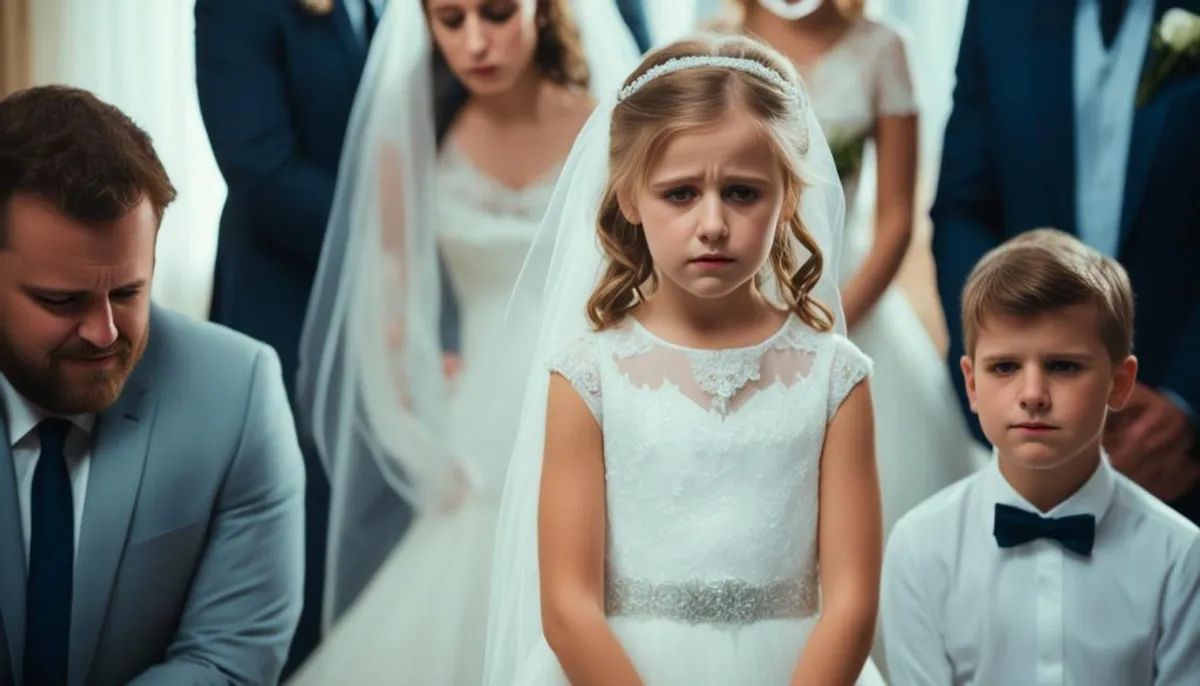Forced marriage is a big problem in many cultures and communities, especially in the UK. It’s common in Muslim, Hindu, and Sikh communities. Unlike arranged marriages, where both people agree, forced marriage happens when someone is forced to marry against their will.
About 1,000 women in the UK face forced marriage every year. This number might be low because many cases go unreported. Forced marriage can make people very unhappy, leading to depression and even suicidal thoughts.
Victims often feel isolated and are shunned by their communities. This is because forced marriage is a sign of deep-rooted gender bias. It takes away the right to say yes or no to marriage. It also makes people more likely to face abuse and violence.

Child marriage is a big worry too. It’s when young people are forced to marry before they’re ready. This is often seen as a cultural or religious tradition but is really a human rights issue. We need to act fast to protect our young people from this kind of abuse.
Understanding Forced Marriage
Forced marriage is a complex issue often mixed up with arranged marriage. While arranged marriage means families help choose partners, the key difference is consent. In forced marriage, one or both people don’t agree to the marriage, and there’s duress involved.
It’s hard to know how many forced marriages happen because many go unreported. Still, it’s thought about 1,000 women in the UK face forced marriage each year. The real number is likely higher, as many cases are hidden or not talked about.
Distinction from Arranged Marriage
Arranged marriage is a tradition in some cultural traditions. It’s different from forced marriage because the young people involved get to say yes or no. Consent is key, meaning they have the right to accept or decline the marriage.
Prevalence and Underreporting
Figuring out how common forced marriage is is hard because many cases are underreported. Victims often don’t speak up because they’re scared, ashamed, or don’t have support. So, the real number of cases is thought to be much higher than what we know.
Psychological Effects of Forced Marriage
Victims of forced marriage often face severe psychological consequences. These can deeply affect their mental health and well-being. They may struggle with depression, low self-esteem, and social isolation.
One of the most worrying outcomes is the increased risk of self-harm and suicide. Young women from certain cultural backgrounds, like Asian communities in the UK, face higher suicide rates. This is due to the pressure and cultural norms around marriage. The feeling of being trapped and losing control over their lives can make them feel hopeless, leading to desperate actions.
Forced marriage can also lead to other mental health issues, such as anxiety, eating disorders, and substance abuse. The trauma and stress of being forced into a marriage can show in many ways. Victims may find it hard to form healthy relationships or trust others in the future.
Common Mental Health Issues
- Depression
- Low self-esteem
- Social isolation
- Self-harm
- Suicidal ideation
- Anxiety
- Eating disorders
- Substance abuse
It’s vital to address the psychological effects of forced marriage. This helps victims and ensures their long-term well-being. Counseling, mental health services, and a supportive network can help them overcome trauma and rebuild their lives.

Forced Marriage: A Human Rights Violation
Forced marriage is a serious violation of human rights and a type of gender-based violence. It denies people the right to choose their own spouse and the freedom to agree to marriage. This is a basic human right. Such marriages often come from patriarchal, oppressive cultural and social norms. These norms put family and community first, not the individual’s freedom, especially for women and girls.
These marriages lead to gender inequalities and can harm the victims’ health, mind, and social life. Forced marriage takes away basic human rights from women and girls, including:
- The right to choose a spouse freely
- The right to control over one’s body
- The right to education and job chances
- The right to be free from gender-based violence and human rights violations
By taking away these rights, forced marriage locks people, often kids, into a life of patriarchal oppression. They face physical, emotional, and social harm. This includes domestic violence, sexual abuse, and being left out by society.
Seeing forced marriage as a human rights violation is key to stopping it. It helps make sure everyone can choose their partner freely. This way, they can live a life of dignity and freedom.
Cultural and Religious Perspectives
Forced marriage is often seen as right by families because of cultural or religious beliefs. But these beliefs are often wrong and based on harmful gender norms. It’s more common in some cultures, like South Asian and Middle Eastern ones. But no big religion supports it.
Families say it’s needed to keep family honor, follow cultural traditions, or keep their children’s purity. But these reasons are not true. They also ignore the basic right to choose who you marry, no matter your culture or religion.
Misguided Justifications
Thinking forced marriage keeps family honor or cultural traditions alive is wrong. It comes from wanting to keep strict gender roles and control women and girls’ lives. Also, the idea of protecting purity through forced marriage is bad. It treats women and girls as objects.
These religious justifications and cultural traditions don’t excuse taking away someone’s right to choose their partner. Forced marriage is a human rights issue. It should be stopped, no matter the culture or religion.
| Justification | Explanation |
|---|---|
| Protecting Family Honor | This belief is rooted in harmful gender norms and a disregard for individual autonomy. |
| Preserving Cultural Traditions | Cultural traditions should not be used to justify the violation of human rights. |
| Ensuring Purity | The notion of “purity” is a discriminatory concept that perpetuates the objectification of women and girls. |
What Is Wrong with Forced Marriage
Forced marriage takes away the basic human rights of those involved. It stops them from making their own choices about who they marry, including the important issue of marriage permission non-saudis. People in forced marriages are often forced by others, through emotional, physical, or financial pressure.
Violation of Consent and Autonomy
Forced marriage is a big problem for human rights. It takes away people’s freedom to decide about their lives and relationships. Those in forced marriages don’t get to make choices about their personal lives.
Increased Risk of Abuse and Violence
People in forced marriages also face a higher chance of being abused or violent. This abuse can come from their families or within the marriage itself. The fact that they’re forced and the danger of abuse are major concerns.
Forced marriage has big effects on those involved. It’s important to understand how it affects their rights, freedom, and safety. Knowing about the issues of forced marriage helps us work towards solving this big human rights problem.
Vulnerability of Children and Disabled Persons
Children and people with disabilities face big risks when forced into marriage. Many are under 18, with some as young as 14. This kind of marriage harms their education and health, and puts them at risk of abuse.
Those with intellectual disabilities or serious mental illness may not fully understand marriage. This makes them easy targets for forced marriages that go against their rights. They also struggle to get the support they need, making them even more vulnerable.
Child Marriage and Its Consequences
Underage marriage is a big problem, causing lasting harm to children. It stops them from getting an education and limits their future chances. They also risk health problems from early pregnancy. Understanding the interplay between marriage and menstrual cycles is crucial in addressing these issues effectively.
Also, child brides are more likely to face abuse and exploitation. It’s important to protect children and disabled people from forced marriage.

| Consequences of Child Marriage | Prevalence |
|---|---|
| Disrupted Education | 1 in 5 girls married before age 18 |
| Health Complications from Early Pregnancy | 1 in 17 girls married before age 15 |
| Increased Risk of Abuse and Exploitation | Highest rates in Sub-Saharan Africa and South Asia |
Legal Implications and Capacity Issues
Forced marriage is a big no-no for human rights and has big legal implications. The Mental Capacity Act 2005 in England and Wales says an adult who can’t make choices can’t say yes to marriage. So, if someone who can’t make decisions gets married, it’s seen as forced, no matter why the family did it.
It’s key to check if someone can make their own choices and if they can really say yes to marriage. This helps stop forced marriages. Laws about capacity and consent are vital. They help keep the rights of those who are more at risk safe and make sure human rights are followed.
| Key Considerations | Implications |
|---|---|
| Lack of Capacity to Consent | Marriage is considered forced, regardless of family’s intentions |
| Ensuring Free and Full Consent | Crucial in preventing and addressing forced marriage |
| Legal Framework on Capacity and Consent | Protects rights of vulnerable individuals and upholds human rights |
The legal implications and capacity issues with forced marriage are key to keeping people safe and respected. By knowing and sticking to the law, we can fight against this bad practice. This helps make a world where everyone’s autonomy and consent is respected.
Conclusion
Forced marriage is a complex issue that goes against basic human rights. It happens because of harmful cultural and social norms. These norms put family and community first, often at the expense of the individual’s freedom, especially for women and girls.
This practice has serious effects on people’s mental, physical, and social well-being. Victims often face depression, isolation, and a higher chance of abuse and violence.
It’s important to focus on helping children and people with disabilities. They are often the most affected by forced marriage. To stop this, we need a strong plan that focuses on rights. It should help those at risk make their own marriage choices and live with dignity.
By summarizing the key concerns, showing the need for action, and protecting human rights, we can aim for a future where everyone is free to choose their marriage and life path. Together, we can build a fair and equal society.
RelatedRelated articles



